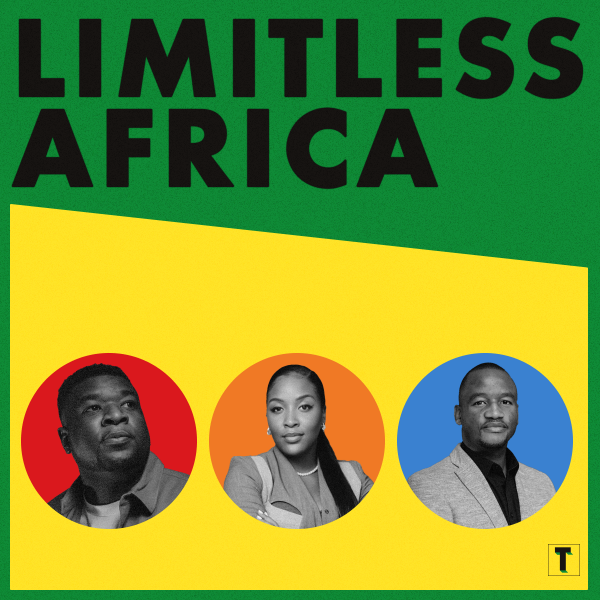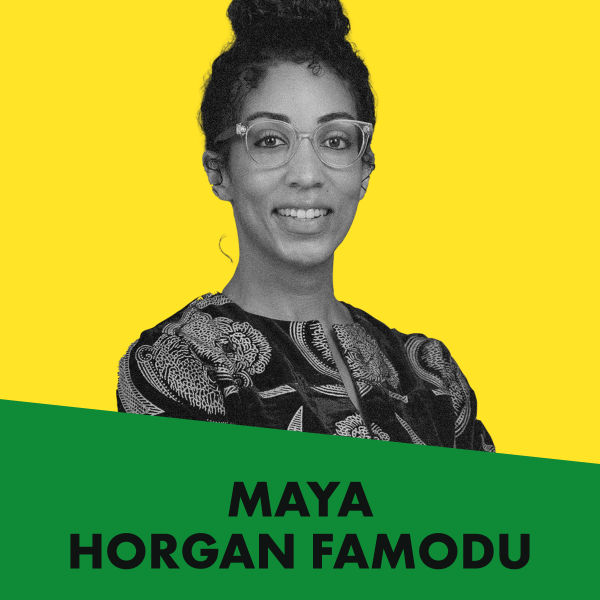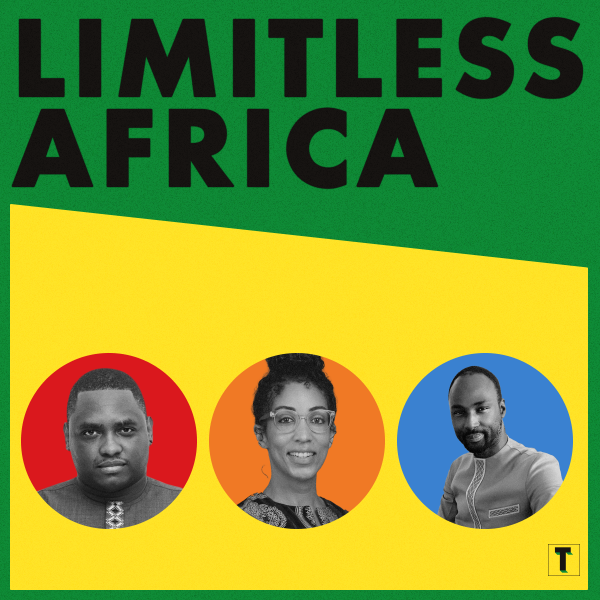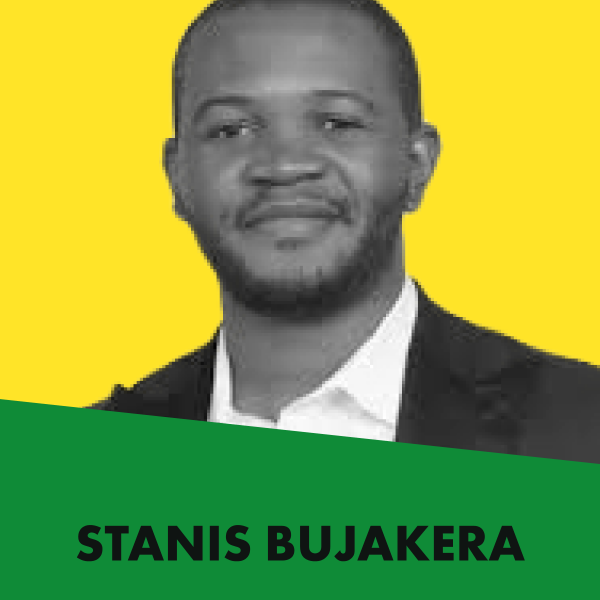Will African music take over the world?
With guests Abdul Abdullah, Mmeli Hlanze, Paola Ndengue

Episode notes
Is African music finally getting the global recognition it deserves? And who’s going to be the next breakout star?
Transcript
From TRUE Africa, I’m Claude Grunitzky, and this is Limitless.
In this episode we’re asking what’s the next big thing in African music
“Music is important because it’s the one thing that can break culture barriers”
“From my perspective looking at it from Africa, the US market has kind of lacked originality and creativity”
“ One other challenge is just the amount of influence that South Africa has on the region. It’s very hard to be original or authentic because of, you know, South Africa.�...
From TRUE Africa, I’m Claude Grunitzky, and this is Limitless.
In this episode we’re asking what’s the next big thing in African music
“Music is important because it’s the one thing that can break culture barriers”
“From my perspective looking at it from Africa, the US market has kind of lacked originality and creativity”
“ One other challenge is just the amount of influence that South Africa has on the region. It’s very hard to be original or authentic because of, you know, South Africa.”
Claude: Welcome to Limitless, the podcast that asks the questions that matter for Africa. We’re looking for African solutions to African problems.
In each episode, we’re asking three guests one question that matters to Africans. And – no surprise – they don’t always agree.
The Limitless Podcast is supported by the U.S. Department of State and the Seenfire Foundation.
Some of the greatest ever Africans are musicians – Fela Kuti, Miriam Makeba or Youssou N’Dour. They can change minds, bring down governments, or simply get us dancing. I talked to three people in the business about why African music is now finally getting the global recognition it deserves and asked them who’s gonna be the next breakout star.
Abdul Abdullah is a Ghanaian American culture entrepreneur and founder of Accra’s AfroFutures Festival – formerly known as Afrochella – which has had headliners like Davido and Black Sherif. He started off by telling me about the festival and how it melds music, fashion, food and art.
Abdul: We consider ourselves a cultural festival where we give equal parts of music, food, art, fashion, right. Creating a space of culture.
I think music is important because it’s the one thing that can break cultural barriers. So I mean, people around the world are currently speaking Yoruba because of Asake and the music that he makes, right? People are really excited to learn those languages. You know, you have people speaking Twe. Why? Because, you know, Black Sheriff is making popular music right now. Right?
Claude: Do you think that that specific African swag that say Wizkid might have or you even even Tiwa Savage would have, do you think that’s changing the perception that the world has of Africans are supposed to act like and how they’re supposed to project the image in the outside world?
Abdul: No, I don’t think that anything that’s happening for African or African artists is changing anything at all. They always have this swag. They’ve always had this edginess element to them on the continent, way before the world started listening. So I think it’s just now that the world is being exposed to it. They are connected with that experience a lot more. Right before Wizkid came to the track he did with Drake, he was already Wizkid too.
He was a household name around the continent, not just in one country in Nigeria, but across the continent. You know, so it was just unfortunate that the rest of the world was just late to the party.
Claude: The rest of the world. was late to the party. I hear that and I’m thinking of all that talent that we see across the continent. How do you think Africans can capitalise on it as opposed to non Africans making the money off of the creativity of Africans?
Abdul: I think first and foremost, there needs to be trust built across the ecosystem. Africans need to invest and apply themselves on the opportunities that exist. We need to develop our own industry, independent of others.
You know, I think most people outside of the continent see it as a capitalization opportunity. We’re connected to it though, right? It’s in our blood. It’s in our veins in our culture. It’s important for us to put our money where our mouth is and really invest in that culture, so that we can draw the benefit out of it.
Claude: Can you tell us a little bit about some of the music artists that you personally have spotlighted… any fun stories with some of your favourite artists?
Abdul: Yeah, I mean, for instance, Jules, I was there on his first one of his first trips to New York City, to support Lauryn Hill in her Diaspora Calling show. So for us, our relationship has blossomed from that. Or when Burna Boy had his major first show at Madison Square Garden, which is historical. That was amazing for me to roll to that show with Stonebwoy, who’s a good friend of mine. And having him see that as an African artist from Ghana who is doing amazing in his own right, watching his fellow African Burna Boy achieve that goal. I thought that was very inspiring those experience
Claude: We know that African music stars, not just Afrobeats, but music stars are becoming household names. You mentioned Burna boy in Madison Square Garden in New York City. Why is that happening in your opinion?
Abdul: Then the music is connected. I think the internet has allowed us have come a lot closer people understand the African we have right now people are trying our food. They’re learning more about our culture. And I think that’s becoming attractive. You know, the dance culture has taken over clothes have taken over people here actual stories. So there’s not only just associated with poverty and begging now they’re seeing other things that that can be seen as African as well right? Things that are more positive.
Claude: Who do you think is going to blow up this year?
Abdul: I’m very bullish. I have some of my favourites like, you know AratheJay , like Mannywellz, our rising star for this year is Essilfie, I’m gonna I’m very excited about the work that she’s going to do. So there’s some amazing talent out there. And I’m looking forward to hear more.
Claude: If you want to know about a trend in Africa, ask Paola Ndengue. Based in Cote d’Ivoire, she’s a specialist in media and the creative industries – and used to work for the music streaming service Boomplay. She started off by telling me why African music was finally getting global recognition.
Paola: I believe there’s a couple of things happening at the same time. The first would be that the US market from my perspective, looking at it from Africa, the US market has kind of lacked originality and creativity for for a few time now, like meaning that pop music, hip hop, and all those like genres that have been driving music consumption kind of started becoming a little bit repetitive. You know, being mainstream is good, but you still always need to have like a new crop of talent coming in and kind of challenging things a little bit, introducing new sounds, and a new approach. So I think there’s one a problem of Yeah, I think originality in terms of like US music itself. That’s one.
Number two: I think there’s kind of also kind of a tick tock effect in in the sense that music has never been this limitless. I guess that’s the name of the castle. Music has never never been this limitless and I really believe tick tock helps a lot. There was a song from Somalia that that went viral. There was a song from you know, Guinea. So it’s really places that us in Africa, we might not necessarily hear about those artists every day, but because of tik tok anything now can become viral. So I think it has really helped with opening minds to you know, different sounds coming from different places. So that’s number two.
Number three, I would say Nigeria has been pushing a lot. So when I say Nigeria is, you know, they have this whole ‘Afrobeats to the world’ plan. And I’ve been lucky enough to kind of study that for the last 10 years. And I can tell that right now, Burna Boys are kind of the symbol of a word that started 16 years ago. I remember some of those Nigerian artists will say that and everybody was laughing. And then he bumped into Kanye West, and you know, so it has been one thing after the other like Germans have been very consistent. And I think that right now, we open the door for the artist from Africa, even though Afrobeat is still leaving already that area, because let me say just in terms of like the, like the production as I was working for Boomplay I had colleagues from other African counties. And, there were no comparison. Looking at Cote d’Ivoice, like we would have maybe, I don’t know, five to 10 new releases every week. Nigeria has nearly 200, Nigeria has been really, really helpful in opening the doors, even for you know, Amapiano also, which to me is also another very massive genre that has been very popular internationally.
Claude: I always saying when people ask you that question, what was the turning point? I always say that it was 2016 when one dance came out, Wizkid and Drake coming together. I think that was a turning point. For this kind of music. what artists do you think are actually going to blow up this year?
Paola: I think it’s interesting to see where Tyla is going to go she had a huge massive hit last year with Water. I’m curious to see how she’s going to crack the pop marketing in I mean, pop r&b market in the US that will be interesting to look at. Now there’s a new artist… I mean, maybe it’s too early to speak. But there’s a new there’s another artist, she’s Nigerian. Her name is Bloody Civilian. I’m looking at her career, how she’s moving. And I think she might also at some point, have a song that’s going to really help her get, you know, a bit more global recognition.
Claude: Mmeli Hlanze is one half of Antidote Music, a music label and artist management company based in Eswatini – that’s a small country of some 1 million people tucked between South Africa and Mozambique. Antidote Music has been in business since 2012 and is now one of the most established labels in the country. Mmeli started off by telling me about their humble beginnings.
Mmeli: Running a record label, we had so many challenges of resources. I mean, we’re recording this right now in a studio that we built about quite eight months ago. But for the longest time, we’ve had to operate from like bedrooms studios, set up like makeshift facilities for the artists that we discovered to be able to record music. Fortunately, we have a very good engineering team that mixes and masters it but if you see some of the places where we record the music, especially at the beginning part, it was crazy how we’re doing it.
Claude: Talking about your early days in Joburg. I was really thinking about the evolution from Kwaito to Amapiano, which is really what is putting South Africa on the map right now.
Mmeli: Yeah, it’s great that you mentioned that Amapiano because for a lot of us in the region and who were on the ground at the time, it isn’t a new phenomenon. You know, it’s only taking the world by storm now. And I think it’s a good time because the world is so in need of just new things. For me as well, one other challenge is just the amount of influence that South Africa has on the region. It’s very hard to be original or authentic because of, you know, South Africa.
Claude: Sorry to interrupt, but I would even say on the world and we all saw at the Grammy Awards, how Tyla was able to win the Grammy and she won over Burna Boy and other people. So anyway, Nigeria was the dominant force, but now South Africa is coming back… so I’m really interested in what you have to say about that specific angle?
Mmeli: I mean, South Africa has always had the advantage of a lot of the industries commercialised quicker than many other African countries. So maybe if I can say they’ve always had the loudest voice…
Claude: and knowing that what is your game plan for Eswatini?
Mmeli: I think the wow effect that always came with Antidote music is that we are the smallest country in the southern African region. There is no major label currently operational in the country. So the likes of Universal, Sony, Warner and the like they operate in South Africa. So there are no machines that are pumping money into developing talent. And that’s, I guess, was our biggest pivot. We’re almost punching above our weight. You wouldn’t expect us to be making music as good as the South African music but in terms of the music, we don’t have a lot of artists from South Africa singing or rapping or whatever the case in siSwati so we started to see these few things to say, actually, let’s start encouraging more of our artists to write music in their mother tongue, instead of writing in English and, and over and above that also the use of like indigenous instruments. We started to encourage that because also over and above just being unique. It’s it’s almost like there’s a preservation that needs to happen because if we’re not getting the young artists to use to sample some of these sounds, then over time, they might they might die down, you know, they might fade away, and that would be a huge loss.
Claude: Which artists do you think are going to blow up this year?
Mmeli: Yeah, we have one of our artists. Her name is Sarnilo. Other than the fact that she’s one of our artists, I really think she’s incredible.
Claude: Have a listen to Sarnilo at Antidote music. I can’t wait to see the trajectories of other musicians like Asake, Black Sherif, Tyla and Bloody Civilian. These are Africa’s new cultural ambassadors. Their talent is Limitless.
Listen next
"It wasn't just an overnight thing. Seeds were planted."
With guests: Maya Horgan Famodu
LISTEN NOW 55 min
How did I make my first million?
With guests: Maya Horgan Famodu, Moulaye Taboure, Moutagna Keita
LISTEN NOW 15 min








